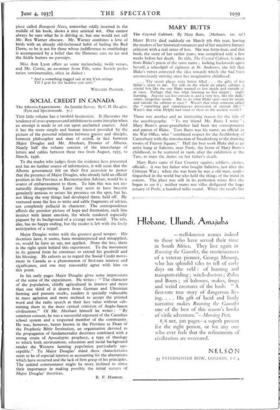SOCIAL CREDIT IN CANADA
THIS little volume has a twofold fascination. It illustrates the tendency of cross-purposes and inhibitions to come into play when an attempt is made to set out upon uncharted courses. And it has the more simple and human interest provided by the picture of the personal relations between raster and disciple, between philosopher and man of action, in fact between Major Douglai and Mr. Aberhart, Premier of Alberta. Nearly half the volume consists of the interchange of letteis and cables between these two from August, 1935, to March, 1936.
To the reader who judges from the evidence here presented and has no further source of information, it will seem that the Alberta government felt on their first accession to power that the presence of Major Douglas, who already held an official position in the Province as Reconstruction Adviser, would be a source of embarrassment to them. To him this was not un- naturally disappointing. Later they seem to have become genuinely anxious to secure his presence on the spot, but he, not liking the way things had developed there, held off. He ventured none the less to write and cable fragments of advice, not completely pellucid in character. The correspondence affords the prettiest picture of hope and frustration, each line instinct with latent emotion, the whole rendered especially piquant by its background of a strange new world. The tale, alas, has no happy ending, but the reader is left with the lively anticipation of a sequel.
Major Douglas writes with the greatest good temper. His doctrines have, it seems, been misinterpreted and misapplied, or, would he have us say, not applied. None the less, there is the right spirit behind this experiment. To the movement in its general form he continues to extend his goodwill and his blessing. He exhorts us to regard the Social Credit move- ment in Canada as a phenomenon of first-rate interest and significance, and one may reasonably agree with him on this point.
In his early pages Major Douglas gives some impressions of the scene of the experiment. He writes : " The character of the population, chiefly agricultural in interest and more than one third of it drawn from German and Ukrainian farming and peasant stocks, renders it specially vulnerable to mass agitation and more inclined to accept the printed word and the radio speech at their face value without sub- mitting them to the more cynical criticism, of Anglo-Saxon civilisations." Of Mr. Aberhart himself he writes : " By common consent, he was a successful exponent of the, Canadian school system and a respected member of the community. He was, however, better known in the Province as. Dean of the Prophetic Bible Institution, an organisation devoted to the propagation of fundamentalist doctrines combined with a strong strain of Apocalyptic prophecy, a type of theology to which both environment, education and racial background render the Western farming popuhtion particularly sus- ceptible." To Major Douglas' mind these characteristics seem to be of especial interest as accounting for the aberrations which have occurred and the lack of firm grasp of his principles. The unkind commentator might be more inclined to stress their importance in making possible the initial success Of Major Douglas' doctrines.
• IL F'HARROrf.










































 Previous page
Previous page